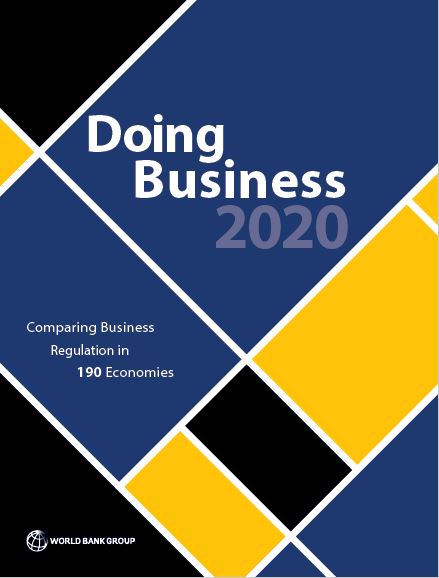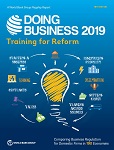
Removing obstacles to entrepreneurship
The case study on reforms analyzes prominent regulatory changes implemented by governments since the inception of Doing Business. Among the most common regulatory changes over the past 17 years are simplifying the requirements to start a company, easing tax compliance burdens, increasing access to credit, and ensuring the survival of viable businesses. The case study also discusses the effects of regulatory changes on various dimensions of economic development and investment activity.

Starting a Business and Registering Property: The role of training in facilitating entreprenuership and property rights
By keeping records of a company’s formal existence and of land ownership rights, business and land registries play a critical role in any economy’s business environment. Registering a new company or a property right is best done when registry officers are well trained and knowledgeable. A combination of targeted training and effective communication to both civil servants and the public can improve the overall quality of the public goods and services provided by business and land registries.

Starting a Business: Transparency of information at business registries
Governments and civil society have come together in recent years to increase the transparency of business information. These changes have been made in the wake of a series of revelations—such as the Panama papers and the Bahamas leaks—that showed the extent to which individuals take advantage of obscure company ownership structures to illicitly move money around the globe.

Starting a business: Third-party involvement in company formation
Formalization has many benefits. Formally registered companies tend to have greater profits, investments and productivity, while their employees benefit from social security and other legal protections. Yet, in many economies around the world, entrepreneurs continue to face excessively burdensome entry regulation. Formalizing a business may involve multiple interactions with government agencies and with third-party private professionals whose services are either required by law or desirable because of regulatory complexity.

Starting a business: The growing efficiency of company registries
Entrepreneurs should have the opportunity to turn their ideas into a business and often a first step is to formally register a company. Yet in many countries the bureaucratic obstacles and high costs imposed by inefficient company registries deter people with good business ideas from embarking on the path of formal entrepreneurship. As the first interface between the regulator and a potential new entrepreneur, company registries hold the key to the formal economy, providing businesses with a legal identity and empowering them to participate fully and within the framework of the law.

Why are minimum capital requirements a concern for entrepreneurs?
Minimum capital requirements significantly slow entrepreneurship. Such requirements also fail to serve their intended purpose of protecting consumers and creditors from hastily established and potentially insolvent firms.

Does Doing Business matter for foreign direct investment?
This case study presents evidence suggesting that Doing Business matters for FDI, supporting a broader claim that economies that provide a good regulatory environment for domestic firms tend to also provide a good one for foreign-owned firms.

How transparent is business regulation around the world?
A growing body of empirical research suggests that while transparency alone might not be enough to increase government accountability, it is certainly necessary.

El Salvador: Starting a business (quickly)
Starting a business, often the first contact between an entrepreneur and the government, was intimidating in El Salvador before its recent reforms. As a result, 38% of entrepreneurs simply started their businesses informally, never registering or paying taxes. Something had to be done.

Serbia: How to double business entry in two years
For decades, starting a business in Serbia was time consuming and burdened with unnecessary bureaucratic hurdles, as rules inherited from Serbia’s communist past were not business-friendly. Some of the biggest problems: the $5,000 minimum capital requirement, cumbersome inspections, and the commercial courts checking every document.

Portugal: One-stop shopping
In 2005 it took 11 procedures and 78 days to start a business in Portugal—slower than in the Democratic Republic of Congo. An entrepreneur needed 20 forms and documents, more than in any other European Union country, and the cost came to almost €2,000. The planning for reform began as soon as new Prime Minister Jose Socrates took office in March 2005.

Azerbaijan: How to reform in 3 months
Before 2008 entrepreneurs looking to start a business in Azerbaijan had to register at 5 different agencies, complete 15 procedures, and file 33 documents. It took more than 2 months. But in 2008 Azerbaijan launched a new company registration system—and the reform went through in just 3 months.

Saudi Arabia: Competitiveness from innovation, not inheritance
Starting a business in Saudi Arabia used to be limited to those who could afford one of the highest minimum capital requirements in the world—$125,000 for limited liability companies. The need to transform the Saudi economy was clear—from one based on inherited wealth to one based on innovation.

Singapore: Harnessing the Internet to streamline procedures
Before 2003, the process to start a business in Singapore was long, tedious, and too dependent on clerical staff entering data by hand. The result was dissatisfaction and delays. Now Singapore’s Internet-based system for registration, filing, and information retrieval—known as Bizfile—is making business startups easier, more efficient, and less expensive.

Yemen gets serious about starting businesses
Yemen, a low-income country, sought to reach middle-income prosperity levels. In its “Strategic Vision for 2025,” the government put private-sector development at the top of its agenda. It started off by reforming business registrations—and that made Yemen one of the top reformers in the Doing Business “starting a business” category in 2009.

Portugal: One-stop shopping
This lesson is part of the Doing Business series, written by “star reformers.” In 2005, entrepreneurs were required to complete 11 procedures that took an average of 78 days to start a business in Portugal, making it a slower process than in the Democratic Republic of Congo. As soon as new Prime Minister Jose Socrates took office in March of 2005, the planning for reform began.
